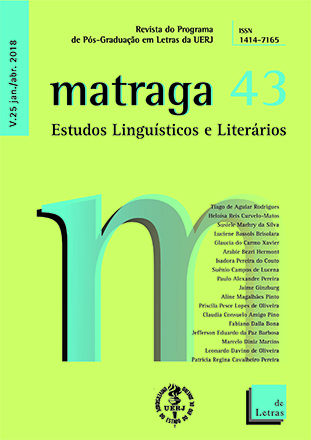The interpersonal metafunction in the 'report' and 'sentence' genres: linguistic contributions to teaching law course
DOI:
https://doi.org/10.12957/matraga.2018.30731Keywords:
interpersonal metafunction, MODE, discourse genres, education.Abstract
This paper analyzes the construction of the mode system in texts of report and sentence genres, produced by first semester students of law in a private faculty in Brasilia. The aim is to discuss the importance of interpersonal metafunction so that students understand how language shows social roles and identities, especially in the field of Law. To reach this goal, the choice of Systemic-Functional Linguistics (HALLIDAY & MATTHIESSEN, 2014; FUZER & CABRAL, 2010; NEVES, 2007; VIAN JR, 2009 and SILVA, 2010) as the theoretical framework adopted in this research is justified. Then, according to this theory, the MODE system is defined, as well as the elements that constitute it (mode (finite + Subject) and residue (preacher + complement + adjunct)), and the discussion of modality is related to discursive genres (SILVA, 2010). In sequence, the development of the activity of writing in the classroom is contextualized, as well as the formation of the corpus. For the analysis of the results, these are crossed with the theoretical assumptions previously presented. The data showed that students, even before having theoretical explanations about the genres in question, have prior knowledge about interpersonal relations in these genres, especially in the sentence, where it is possible to better define the main actant: the judge. These results confirm the need to explore lexical-grammatical aspects linked to the production conditions of the genres in the classroom, as well as they suggest that the interpersonal metafunction can be a kick-start to discuss social roles with students who are starting their studies in higher education.
Downloads
Downloads
Published
How to Cite
Issue
Section
License
Authorization
Matraga – Scientific Journal of the Post-graduate Program in Arts and Humanities of UERJ is authorized to publish the article submitted here, if it is accepted for online publication. It is attested that the contribution is original, that it is not being submitted to another publisher for publication, and that this statement is the expression of truth.
The works published in Matraga's virtual space – Scientific Journal of the Post-graduate Program in Arts and Humanities of UERJ will be automatically transferred, and your copyright is reserved to Matraga. Its reproduction, in whole or in part, is conditional on the citation of the authors and the data of the publication.

Matraga uses license Creative Commons - Attribution-Non-Commercial 4.0 International.





